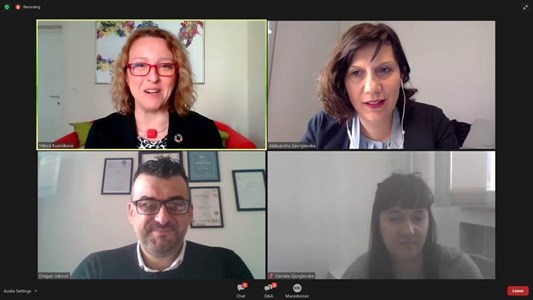
The webinar on Mobile and Outreach Services that we organised today, brought together over 160 local government representatives, experts and practitioners who explored the benefits that these services bring to the community, the principles of their planning and implementation, stakeholders involved, as well as the challenges associated with their success and sustainability. The webinar was hosted by the Association of Municipalities and Towns in the Republic of Srpska and the Association of Municipalities and Cities in the Federation of Bosnia and Herzegovina.

The mobile and outreach services have a huge importance, providing support to vulnerable population and hard to reach community groups and ensuring that no one is left behind. However, they are mainly provided by the civil society sector, without systematic approach, involvement of all relevant stakeholders and secure funding to ensure sustainability. Acknowledging and supporting the pioneer steps to institutionalise mobile and outreach services in the region, we all have to do more – these were some of the conclusions of the panellists and participants of the webinar, moderated by Ms. Nikica Kusinikova.
The Social Services Expert, Ms. Aleksandra Georgievska presented the concept of mobile and outreach services, the scope, benefits and steps in the provision of these services, from the preparation phase, up to monitoring and evaluation of the results. Ms. Georgievsska explained that mobile and outreach teams serve a wide range of citizens such as poor families in particular children and youth, people with mental health issues, persons with disabilities, street children, children in crisis, foster families, elderly people etc. “Considering the importance of mobile and outreach services and the support they provide to the ones left behind, filling in the gaps of the state services, the local level must engage more”, concluded Ms. Georgievska.

For the municipality, mobile and outreach teams support building trust, bring vulnerable groups “on board” and provide long-term solution to social inclusion, alleviating poverty and reducing inequalities.
Mr. Dragan Jokovic from the Citizens Association for the promotion of Roma education “Otaharin”, from Bijelina, Bosnia and Herzegovina, presented their experience with mobile intervention teams, positively affecting lives of Roma children and their families.

Ms. Daniela Gjorgievska from the Defence for Children’s Rights Association, operating in Shuto Orizari community in Skopje, North Macedonia, elaborated their experience in mobile and outreach services for children and families at risk during COVID-19.

Participants again had a very active role during the webinar, sharing not only their questions and ideas, but also their good practices. Representatives from the municipality of Stara Pazova in Srbija shared their experience in supporting elderly and people with disability through mobile teams, as a result of which in 2009 the municipality established a home support service. Municipality of Smederevska Palanka shared their experiences in mobile teams for inclusion of Roma, as well as the coordinator for Roma issues in the city administration.
“We shall not forget that one of the tasks of the mobile teams is the development of a social network. Connecting all stakeholders in a social network can provide us with a great overview of the situation in the field, as well as citizens’ specific needs that we have to address”, concluded the representative of Stara Pazova.
Materials from the webinar
 Agenda-Mobile and Outreach Services Webinar 04.03.2021
Agenda-Mobile and Outreach Services Webinar 04.03.2021
 MOT webinar – Aleksandra Georgievska
MOT webinar – Aleksandra Georgievska
Video recording
This webinar is activity of the NALAS project “Enhancing local capacities to implement the 2030 Agenda and the Leave No One Behind Principle”, implemented by the associations of local authorities from the Western Balkans in cooperation with and supported by the regional project on “Social Rights for Vulnerable Groups”. The regional project is implemented by the Deutsche Gesellschaft für Internationale Zusammenarbeit (GIZ) on behalf of the Federal Ministry for Economic Cooperation and Development (BMZ).